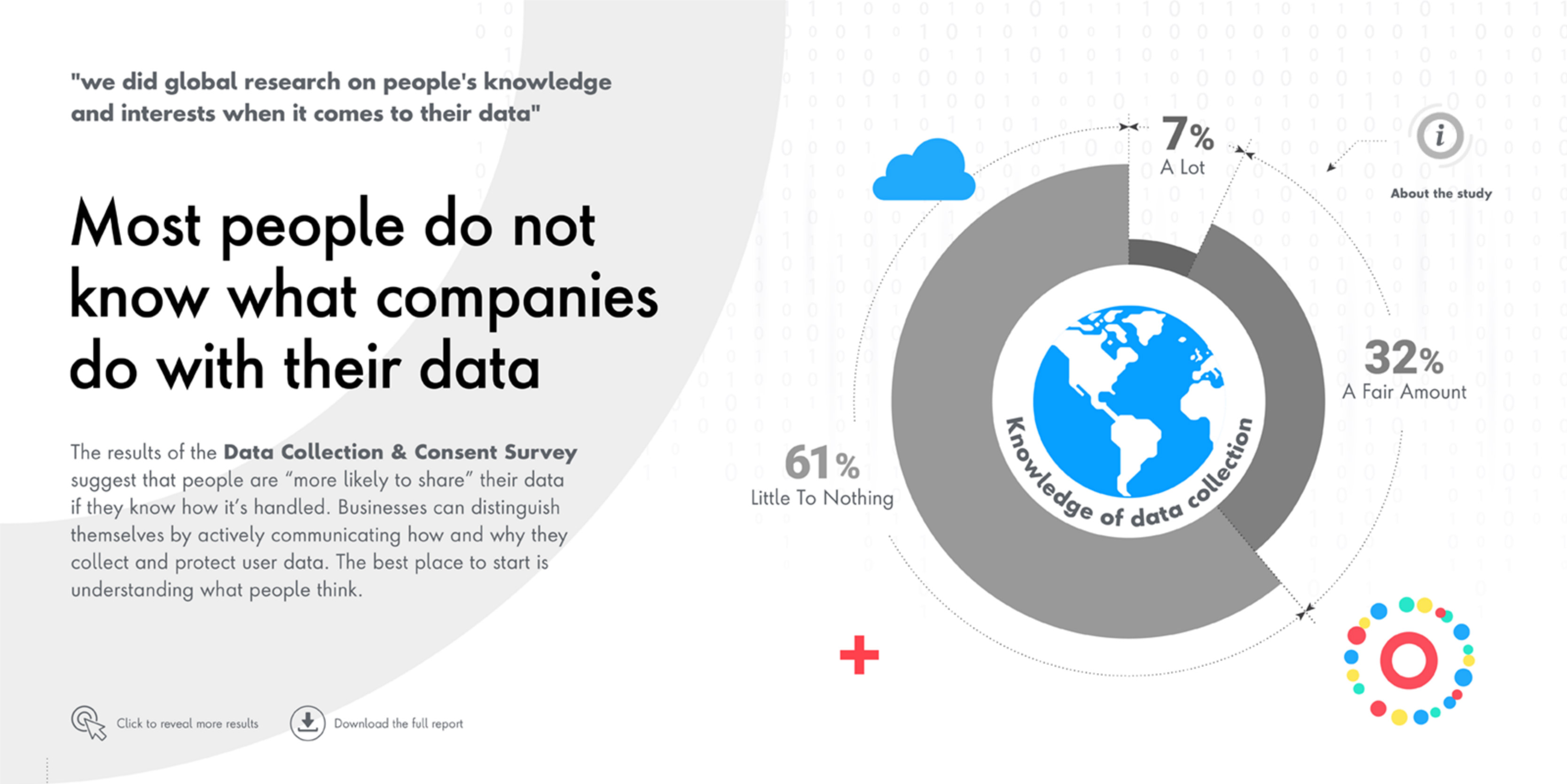What issue can we solve for you?
Type in your prompt above or try one of these suggestions
Suggested Prompt



The Data Collection & Consent Survey
The Data Collection & Consent Survey
Global Research Powered by IPSOS
Publicis Sapient and Google Cloud conducted wide-ranging research on consumer attitudes toward data privacy, identity and transparency. The report provides extraordinary insights into how brands can best manage their customer relationships.

The Data Collection & Consent Survey
Learn how people with varying levels of technology literacy across countries and generations feel about data privacy.
The protection of data privacy will distinguish brands as reliable, professional and ethical. Businesses should share how they use data and listen to what consumers think. The key to success in privacy branding is reaching people where they are – based on their level of digital nativity or privacy sensitivity.
Among Our Notable Findings
Most people have blind spots: A staggering 61 percent of people surveyed say they know little to nothing about what companies do with their data, while only seven percent consider themselves well-informed on this topic. While the percentage of people who know little to nothing vary greatly by nation, this means knowledge is power. Companies globally have a great opportunity to educate customers on how their data is handled, thereby proving themselves trustworthy—a reputation that will go a long way toward attracting more customers.
Consumer comfort varies greatly by generation: Younger generations know more about how companies handle their data and show higher satisfaction with their level of privacy online when compared with their older counterparts. Baby Boomers are most likely to see the benefits of data collection when they have more control over the data and the ability to delete this information.
Willingness to give data correlates with knowledge: Contrary to prevailing wisdom, people who know more about what companies do with personal data tend to see the benefit in companies collecting this information. In France, for instance, of those who know a lot about data collection, 41 percent consider it a net positive and 22 percent consider it a net negative. Of those who know little to nothing, seven percent see it as a net positive, while 60 percent see it as a net negative.
Understand Concern, Build Trust
Technology moves quickly. It’s easy to feel confused, overwhelmed or uneasy by the pace of change – especially when personal information is involved. Most people are aware their data helps provide tailored services, but they aren’t as clear about how the information is gathered. This lack of insight leads to suspicion of data collection despite overwhelming appreciation for the modern conveniences and digital experiences that result.
While some might assume informed consumers are the most skeptical of data collection and unaware consumers are the most trusting, Publicis Sapient’s inaugural “Data Collection & Consent Survey” suggests the opposite. Someone’s faith in a company to use their data in a safe and ethical manner strongly correlates with that organization’s honesty and transparency.
Building a robust and versatile customer data platform (CDP) protected by a cleanroom is perhaps the greatest way to protect customer information and deliver unrivaled digital experiences. This is just as much a boon for consumers, so companies should be eager to adopt, implement and even promote their CDP.
No company is entitled to a consumer’s trust. That’s earned. Companies should be transparent about why and how they collect and safeguard data. Trust is reciprocal. If a business isn’t willing to share how it protects data with people, it shouldn’t expect people to share their data. To serve the people, you need to understand their concerns. Anyone looking to improve lives through digital transformation must rely on data collection

Solution
CDP Quickstart
Before launching a CDP, organizations often struggle to align every team responsible for the collection and handling of data on key issues. Publicis Sapient has distilled decades of experience in datamanagement into a single solution that helps companies get CDPs up and running in no time. There’s no excuse for relying exclusively on advertising to understand customer behavior. In-depth, actionable insights are just weeks away.
Data Collection and Transparency. Getting It Right.

“Americans are reluctant to share their data. When given choices about sharing data to get benefits, most will decline to share. They are more likely to say their data has more value than the services they receive in exchange.”
– The Data Collection & Consent Survey
How Possible Is It for You to Have Data Privacy in Today’s World?
The Results
The results from the Data Collection & Consent Survey suggest that data privacy is not something companies should prioritize merely to comply with laws and regulations in different regions. As digital identity is further decentralized, businesses should take it upon themselves to gather, handle and protect data in ethical ways that respect the rights of individuals. Being proactive takes courage and will distinguish data-privacy leaders from laggards in the years to come.

Reliable technological solutions
Adopting strong, reliable technological solutions like CDPs can ensure that a business is fulfilling its dual mandate of collecting data from people and respecting their rights. To stay progressive and digitally enabled, it’s important to build these CDPs in the cloud.
Cloud
Far greater than a decentralized storage space, the cloud revolutionizes entire industries and enriches lives through previously unimaginable services. Although cloud computing will affect us all, to truly capitalize on the cloud’s potential to deepen and expand our digital lives, we must be willing to share some of our personal data.
Related Reading
-
![Data Privacy hero Image]()
Insight
How Data Privacy is Done Right
Businesses are in a scramble to become compliant with the new privacy rules—but compliance should not be the sole focus.
-
![CDP 3 Tips]()
Insight
Three Tips for a Successful Customer Data Platform
Data allows a business to better target market activities across channels and share actionable insights throughout the enterprise.
-
![Why Build your Customer Data Platform in the Cloud?]()
Insight
Why Build your Customer Data Platform in the Cloud?
The value of a CDP is clear, and getting your data onto the Cloud is Priority One. We’ve outlined five key reasons.
-
![CDP main page hero]()
Services
Customer Data Platform: Switch on Your Sixth Sense
Build a CDP that makes customer-centricity your edge.

The Data Collection & Consent Survey
Learn how people with varying levels of technology literacy across countries and generations feel about data privacy.











